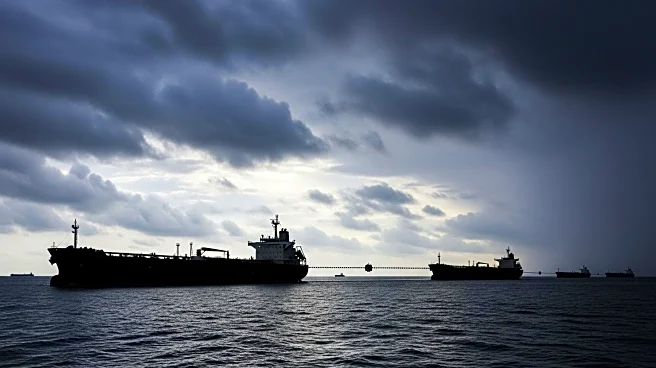What's Happening?
The captain of an oil tanker, allegedly part of Russia's shadow fleet, is set to face trial in France. The tanker was detained off France's Atlantic coast, with French President Emmanuel Macron suggesting its connection to Russia's fleet of aging tankers that circumvent Western sanctions. The captain and chief mate, both Chinese nationals, were detained but later released, with the captain facing charges of non-cooperation and failing to justify the vessel's nationality. The trial is scheduled for February 23, 2025, in Brest, France. The ship, reportedly carrying a large oil shipment from Russia to India, was found without a flag, raising suspicions about its true ownership and purpose.
Why It's Important?
This development highlights the ongoing geopolitical tensions surrounding Russia's oil exports amidst Western sanctions. The shadow fleet, consisting of older tankers, plays a crucial role in Russia's strategy to bypass these sanctions, reportedly financing a significant portion of its war efforts. The trial could set a precedent for how European nations handle similar cases, potentially impacting Russia's ability to sustain its oil export operations. The situation underscores the broader economic and political stakes involved, as European countries seek to enforce sanctions and limit Russia's financial resources.
What's Next?
The trial of the tanker captain could lead to increased scrutiny and enforcement actions against other vessels suspected of being part of the shadow fleet. European nations may intensify their efforts to monitor and detain such ships, potentially disrupting Russia's oil export routes. The outcome of the trial could influence future legal and diplomatic strategies in dealing with similar cases, affecting international maritime law and sanctions enforcement.
Beyond the Headlines
The case raises questions about the effectiveness of international sanctions and the challenges in enforcing them. It also highlights the complexities of maritime law and the difficulties in tracking and regulating vessels with opaque ownership structures. The situation may prompt discussions on enhancing international cooperation and legal frameworks to address such issues more effectively.










